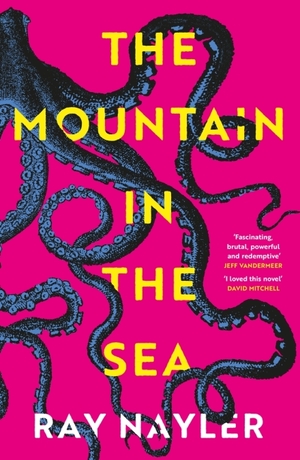
The Mountain in the Sea
by Ray Nayler
Genres: Science FictionPages: 456
Rating:

Synopsis:There are creatures in the water of Con Dao.
To the locals, they’re monsters.
To the corporate owners of the island, an opportunity.
To the team of three sent to study them, a revelation.Their minds are unlike ours.
Their bodies are malleable, transformable, shifting.
They can communicate.
And they want us to leave.When pioneering marine biologist Dr. Ha Nguyen is offered the chance to travel to the remote Con Dao Archipelago to investigate a highly intelligent, dangerous octopus species, she doesn’t pause long enough to look at the fine print. DIANIMA- a transnational tech corporation best known for its groundbreaking work in artificial intelligence – has purchased the islands, evacuated their population and sealed the archipelago off from the world so that Nguyen can focus on her research.
But the stakes are high: the octopuses hold the key to unprecedented breakthroughs in extrahuman intelligence and there are vast fortunes to be made by whoever can take advantage of their advancements. And no one has yet asked the octopuses what they think. And what they might do about it.
Lately, I’ve had a lot of trouble getting immersed in books like I (think I) used to. I’ll read 50 pages and feel like it’s been forever; read 10 pages and get distracted by wondering if that email I’m waiting for has come in; a 500 page book is just daunting because it seems like it’ll take forever. And I know, I know, it’s all the fragmentation caused by mobile phones, etc, etc — but while I was reading Ray Nayler’s The Mountain in the Sea, I wasn’t paying any mind to that. My brain was quiet and I was totally focused on the story; I say this by way of introduction because I think it bears saying when a book cuts across that fidgeting and demands attention.
There are essentially three threads to the story, which twine together but never quite meet: there’s Ha Nguyen, a scientist, who is brought to a remote island owned by a company called DIANIMA in order to study octopus behaviour that appears potentially much more intelligent than baseline; there’s Rustem, a hacker with a unique way of thinking, who is given a fascinating task to hack into an extremely complex artificial intelligence in order to use it as a weapon; and there’s Eiko, a captive aboard an AI-controlled fishing ship, forced to clean and sort the catch with no sign of escape.
Of the three stories, Dr Ha’s is the most fascinating, and I admit it could be a little annoying to switch to Eiko or Rustem. Ultimately, I’m not sure their stories were entirely necessary: I admire the overall effect, the details that the other two stories lent to Dr Ha’s, and the satisfying click as things came together, but Eiko’s story didn’t lend a lot to it (and his mind palace is overdescribed for something so ultimately useless to the plot — though I think in terms of themes, it does add to the overall inquiry into how thought works).
Despite how much I liked the reading experience, I think there are still things the book could’ve dug into deeper. Evrim’s cognition is important to this question of intelligence, and yet it’s rather brushed under the rug by Ha, who readily declares them to be human all of a sudden, based on the fact that they can interact with humans on human terms. I’m not sure I agree with that definition, or the simplification of it all. There were tantalising bits of inquiry here about artificial intelligence as well as alien (octopus) intelligence, but it feels like it didn’t quite go deep enough; perhaps Eiko’s thread should’ve been reduced in order to give more space for that.
The same goes for the octopus cognition, really: sometimes Ha comes to conclusions rapidly based on fairly little evidence. Is something built of human skulls necessarily an altar? Does it necessarily mean that they’re worshipping humans or trying to appease them? Are you sure it’s not a war trophy?
That makes the book sound unsatisfying, and I don’t think it is: personally, I found it fascinating and riveting. There’s just so much space to expand, as well.
Rating: 4/5

I really enjoyed a third of this book (the same third), which was enough for me to rank it highly too – it really is a fascinating read even when I could definitely have done without the Eiko chapters.
I’m just not sure they added enough to justify the amount of page count they added!
I need to keep reading him.
If you haven’t read The Tusks of Extinction, it’s a must, and it’s short: https://wordsandpeace.com/2024/01/27/book-review-the-tusks-of-extinction/
I have, I quite liked it!